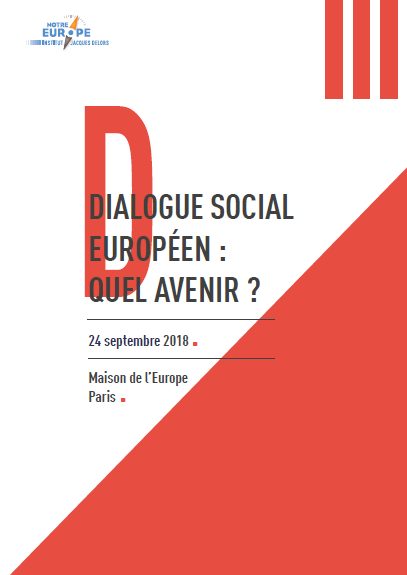Paris, 24 September 2018 – European social dialogue: what future?
The Jacques Delors Institute is organizing, in partnership with the French trade union CFDT and the Maison de l'Europe in Paris, a conference on European social dialogue and its perspectives, on the occasion of the publication of the Jean Lapeyre, "History of a social innovation from 1985 to 2003" (in French).
The leaders of the 28 EU countries proclaimed last November at the Göteborg Social Summit the European Pillar of Social Rights (EPSR), which defines 20 principles and fundamental rights applicable to all Member States. It reaffirms the importance of European social dialogue in the design and implementation of economic, social and employment policies.
In recent years, however, the European social dialogue has been severely tested. The enlargement of the EU to countries in Central and Eastern Europe, which have different traditions and cultures of social relations and negotiations, has been a challenge for the dynamics and effectiveness of the European social dialogue. More recently, the crisis in Europe has had an impact on social dialogue at the national level; in several countries social dialogue has been decentralized or weakened. Ongoing changes in the labor market, such as the development of atypical forms of contract or dynamics such as digital and energy transitions, pose new challenges to the representativeness and priorities of action of the social partners, both national and international. European. The current difficulties faced by the European social partners are illustrated by the lack of agreement between them on the Commission’s first proposals to implement the 20 principles of the SEDS, in particular the Directive on reconciliation between work and private life. In such a context, how to revive and consolidate the dynamics of the European social dialogue?
After a welcome by Catherine Lalumière, President of the Maison de l’Europe, and an introduction by Jean Lapeyre, former Deputy Secretary of the European Trade Union Confederation, a panel brings together Laurent Berger, General Secretary of the CFDT, Maxime Cerutti, director of social affaires of Business Europe and Katja Lehto-Komulailen, deputy general secretary of the European Trade Union Confederation, around the question “Social dialogue: what future?”. This debate is moderated by Frank Vandenbroucke, former Belgian minister of Labour.
To register, visit the website of the Maison de l’Europe.
The leaders of the 28 EU countries proclaimed last November at the Göteborg Social Summit the European Pillar of Social Rights (EPSR), which defines 20 principles and fundamental rights applicable to all Member States. It reaffirms the importance of European social dialogue in the design and implementation of economic, social and employment policies.
In recent years, however, the European social dialogue has been severely tested. The enlargement of the EU to countries in Central and Eastern Europe, which have different traditions and cultures of social relations and negotiations, has been a challenge for the dynamics and effectiveness of the European social dialogue. More recently, the crisis in Europe has had an impact on social dialogue at the national level; in several countries social dialogue has been decentralized or weakened. Ongoing changes in the labor market, such as the development of atypical forms of contract or dynamics such as digital and energy transitions, pose new challenges to the representativeness and priorities of action of the social partners, both national and international. European. The current difficulties faced by the European social partners are illustrated by the lack of agreement between them on the Commission’s first proposals to implement the 20 principles of the SEDS, in particular the Directive on reconciliation between work and private life. In such a context, how to revive and consolidate the dynamics of the European social dialogue?
After a welcome by Catherine Lalumière, President of the Maison de l’Europe, and an introduction by Jean Lapeyre, former Deputy Secretary of the European Trade Union Confederation, a panel brings together Laurent Berger, General Secretary of the CFDT, Maxime Cerutti, director of social affaires of Business Europe and Katja Lehto-Komulailen, deputy general secretary of the European Trade Union Confederation, around the question “Social dialogue: what future?”. This debate is moderated by Frank Vandenbroucke, former Belgian minister of Labour.
To register, visit the website of the Maison de l’Europe.
Maison de l'Europe
France
Paris
SUR LE MÊME THÈME
ON THE SAME THEME
PUBLICATIONS
Forty Years After Its Creation: What Relaunch for European Social Dialogue?

Social Priorities under the von der Leyen II Commission

Regional risk of poverty in the EU-27

MÉDIAS
MEDIAS
Commission européenne : la Roumaine Roxana Minzatu, poids léger du social

Quelle ambition sociale pour la nouvelle Commission européenne ?

En Europe, le grand chamboulement du marché du travail

ÉVÉNEMENTS
EVENTS
Académie Notre Europe – “Social Europe” session [FR]

My Europe – The European Union, ally or danger for workers? [FR]

The European Union and work: what competences, what debates, what perspectives? [FR]

Euroquestions | Porto Social Summit: 3 years after Göteborg, which social Europe? [FR]

What place for responsible capitalism in Europe? (FR)

Comment garantir une relance verte et juste ?

Webinar | SURE : a welcomed catalyzer for an European Unemployment Insurance*

Académie Notre Europe n°5 – Social Europe and Budget

European Pillar of Social Rights: a guarantee for welfare system?

Barcelona, 25 October 2019 – Sovereignty, inequalities and social Europe

Ludwigsfelde, 2 October 2019 – Citizen dialogue and Trilateral Experts seminar on Social Europe

Paris, 5 September 2019 – Global Convergences Forum

Paris, 21 May 2019 – Europe: which answers to the Digital economy’s social challenges?

Argenteuil, 11 mai 2019 — Europe and fraternity

Paris, 6 April 2019 — Social justice in the energy transition in Europe

Paris, 5 April 2019 – European elections: what stakes for disability?

Training on European issues

Bruxelles, 21 February 2019 – Expert Debate on the European Pillar of Social Rights

Paris, 18 December 2018 – Social Europe

Paris, 11 January 2019 – Académie Notre Europe: Social Europe

Paris, 20 November 2018 – How to accompany the low-carbon transition to be fair?

Saint-Maur-des-Fossés, 14 November 2018 – What is Europe doing to protect us? Trade Policy, Social Europe, Environment and Security

Paris, 24 October 2018 – Companies: missions and reasons to be

Dardilly, 10 October 2018 – What future for social Europe?

Brussels, 3 October 2018 – Europe needs a social pact for the energy transition

Paris, 3 October 2018 – Is European solidarity still possible?

Bruges, 12 July 2018 – Just a transition or a just transition? Jobs, skills, energy poverty

Luxembourg, 20 June 2018 – The reform of the EMU: which social dimension?

Paris, 17 May 2018 – France and the European Pillar of Social Rights

Toulouse, 17 April 2018 – A protective Social Europe : myth or reality?

Tours, 4 April 2018 – Toward a Social and Political Europe?

Angers, 29 March 2018 – From the Treaty of Rome to today

Paris, 2 February 2018 – How to deal with the populist phenomenon?

Champigny-sur-Marne, 23 January 2018 – Social Europe

Aulnay-sous-Bois, 16 December 2017 – Active Citizens Forum

Paris, 5 December 2017 – The future of social democracy

Luxembourg, 21 October 2017 – Europe: Changing the economic and social framework

Brussels, 16 October 2017 – “Making the Energy Transition a European Success”

Paris, 28 September 2017 – What future for a Social Europe?

Créteil, 28 September 2017 – Social Europe: utopia or reality?

Brussels, 10 July 2017 – Guaranteeing solidarity in EU Cohesion policy post-2020

Prague, 8 June 2017 – Hamonization of EU social standards

Rome, 20 March 2017 – Completing economic governance and enhancing social cohesion


















